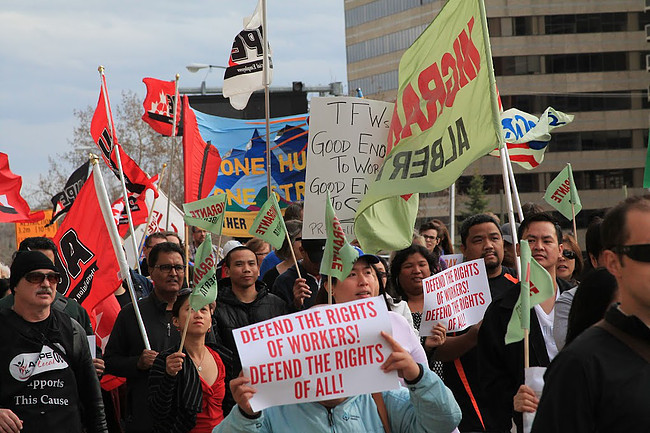
With an overwhelming voice, millions of Filipino voters — including 407,000 overseas Filipinos — have dramatically brought the Filipino nation to still another turning point in our history. The people have chosen lawyer and politician Rodrigo Duterte to lead them away from the crimes, ills, deceit, feebleness and decrepit morality of the past Benigno Aquino regime. The desired change they cry for is certainly obvious: a solution to the basic problems of the country that have plagued the basic masses — widespread unemployment, chronically low wages, contractualization, landlessness, the lack of basic social services, corruption, the rampant violations of human rights and of national sovereignty. The resulting poverty in the Philippines today marks even the capital region of Manila and its districts, where an average family lives on a measly P22. to P37. a day ($0.60 to $1.01 in Canadian currency). Such extreme poverty is staggering and ironic in a resource-rich country, where the world’s wealthiest corporations have been allowed to establish huge agribusiness projects and to extract gas, gold and other minerals with little concern for the rights and welfare of local communities. The plunder that goes on has clear links to poverty, which past governments have shamelessly maintained and supported.
Of course the people want to spit out and trash these problems quickly, and clear the ground for change. However, the problems have become fixed in a system that has been developed over the decades, and has increasingly worked against the people’s interests. Like cancer, the system has also invaded foreign shores, to follow and beseige those Filipino migrant workers who have gone out of the country to seek personal solutions, and have been made pawns in a state-enforced labour export policy. Migrants arrive with great hope, only to find that the cancerous situation for the Filipino nation, wherever it exists, is unrelenting, and they must always struggle to survive. The old cancerous system from the past century, against which people rose in revolution, has worsened through corruption and the greed of landlords and the business elite, and flourished through the neoliberal policies adapted by successive governments, and moreover, today, it has been integrated with a global system set by the self-serving corporate agenda of world trade and business. This present system of advanced cancer continually abuses the whole Philippine economy, its sovereignty, and its people — wherever they are.
There are now 12-15 million Filipino migrant workers abroad, and their numbers are increased by more workers leaving the country at the rate of 6,000 a day — which is clear proof that joblessness and unemployment levels remain high despite state declarations to the contrary. As evidence of the Aquino government’s dependence on migrant workers, by the end of 2015, Bangko Sentral recorded that workers had sent a total remittance of $39 billion US. And yet, according to Migrante International’s documentation, many persons in this labour force, an estimated 1/4 of the total labour force of the country, have had to suffer, and still suffer, from injustices such as: imprisonment (92 on death row); being stranded in war-torn areas; illegal recruitment and human trafficking; increased state exaction; a dismal safety and service program; misused OWWA funds. Over and above all of that, they have to bear the tremendous social cost of their lengthy separation from their families, as they bow to the demands of immigration laws.
The solution will not be easy to accomplish, but the people’s organizations can offer their recommendations and proposals to the new government, and many have already done so. Migrante Canada and Bayan Canada, trusting that the Duterte government will hold steadfast to its announced political will to serve the people, backs the pro-people agenda already presented by Migrante International to government. We also welcome the government’s idea of setting up a Department for OFWs, provided that it is integrated to an over-all program that addresses joblessness in the Philippines and which moves towards making migrant work an option rather than a forced necessity.
To realize and actualize change in the lives of migrant workers, we believe that the Duterte government can, within its six years of office, work towards creating the foundations for a decent life for all Filipino workers by bringing about the following, which Migrante International has pinpointed in its proposal:
– 10 million sustainable jobs in the Philippines within six years;
– A stop to contractualization of labour in the country;
– A genuine agrarian reform program;
– Free basic social services such as education, health care and housing;
– A genuine reintegration program for retiring OFWs and a universal pension system;
– A planned economy to ensure the trickle-down of OFW remittances to national industrialization and land reform;
– An efficient mass transport system. better internet and IT utilities that OFWs can come home to;
– Fast, efficient and more accessible venues for OFWs in distress, both in the Philippines and abroad;
– Competent and OFW-friendly embassy and department officials;
– Rights-based bilateral labour and immigration agreements with labour-receiving countries;
– Justice and indemnification for all victims of illegal recruitment and trafficking;
– An end to all schemes and government policies that treat OFWs as mere milking cows;
We are at a historic turning point, and the future of the nation is in the balance. As we, in the organizations of Migrante and Bayan Canada look forward to the changes that the new Philippine government will make in a direction that serves the interests and welfare of migrant workers, we firmly believe that the opening of avenues of coordination between the people’s organizations and government authorities will facilitate much-needed change.
If we are to serve the people, we must heed the people.
Hear the people’s cry! Let the people’s voice be heard. — Migrante Canada and Bayan Canada’s Statement on the Proclamation of President Duterte